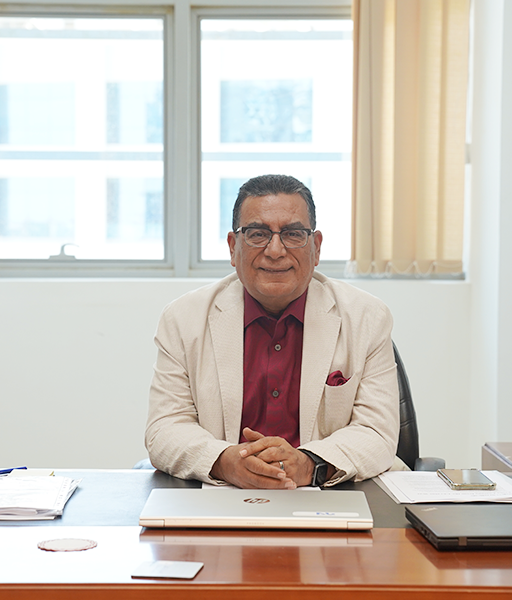
Quality Assurance Unit
Quality Assurance Unit
NU Business Administration Quality Assurance Unit is responsible for ensuring that the Business School is maintaining and improving the quality of its education and research activities. This involves monitoring and evaluating various aspects of the university's operations, such as academic programs, teaching and learning, student services, research activities, and institutional management.

Prof. Hassan Aly
Dean of Business Administration School
I would like to salute our students, faculty, and all stakeholders who participated in the making of all the activities reported here. The School of Business Administration at NU is a very progressive educational entity that prides itself on providing state of the Arts knowledge in the field of business and economics and it's an honor to report that our graduates are having close to zero unemployment rates.
At the School of Business and Economics, we strive to provide our students with the best possible working opportunities to help them succeed in achieving their life goals. Whether a successful entrepreneur with a growing startup, an effective employee of a bank or a financial institution with fair and dignified compensation, or a student in an international university finishing their Master's or Ph.D., our students are roaming the markets nationally, regionally, and internationally.
We are committed to providing a supportive and stimulating learning environment that encourages creativity, critical thinking, and collaboration. Exposing our students to international peer universities with whom we have dual degrees and all sorts of student exchanges and partnerships is our goal and we are very confident that our students ( graduate and undergraduates) will find our courses, programs, and delivery modes to be engaging, interactive, practical, and ultimately rewarding.
Sincerely,
Hassan Y. Aly,
Vision
Working on the continuous development of the quality management system at the School of Business Administration, Nile University, in line with the vision of the university, to ensure regional and international academic accreditation.
Mission
Follow-up and developing the quality of the performance of the educational process, scientific research, community service, and development, through innovation, entrepreneurship, and sustainability as essential elements in the mission of the university and the school, and in accordance with national and international standards to ensure education quality and accreditation.

Dr. Zakaria Yahia
Associate Professor
Dr. Zakaria Yahia received a B.Eng. degree with honors in Industrial Engineering from Fayoum University, Faculty of Engineering at Fayoum, Egypt, in 2006. Then he received the M.Sc. and Ph.D. degrees in Industrial Engineering from Cairo University, Giza, Egypt, in 2012 and Egypt-Japan University of Science and Technology (E-JUST), Alexandria, Egypt, in 2015, respectively. As a visiting Ph.D. student, he spent one academic year (2014) at the Tokyo Institute of Technology (TITECH), Tokyo, Japan. From 2017 to 2020, he was a Postdoctoral Researcher with the Department of Quality and Operations Management, University of Johannesburg, South Africa.
Currently, Dr. Zakaria is a full-time Associate Professor at the School of Business Administration, Operation Management and Supply Chains (OPMG) Program, Nile University, Egypt. He is a full-time Associate Professor (On-leave) at the Mechanical Engineering Department at Fayoum University. He is a former Adjunct Assistant Professor at the Egypt-Japan University of Science and Technology (E-JUST) and October University for Modern Sciences and Arts (MSA). From 2015 to 2020, he was a full-time Assistant Professor at the Department of Mechanical Engineering, Fayoum University, Fayoum, Egypt.
Dr. Yahia is a Co-PI of one research project funded by the Japan International Cooperation Agency (JICA) about using computer simulation and optimization approaches to mitigate the impact of COVID-19 outbreaks. He has authored/co-authored around 30 papers distributed between high-impact journals, conferences, and book chapters. His research interests include the areas of Applied Operations Research, Optimization, DEMO-based Enterprise Ontology, Modelling and Simulation of different research problems and applications such as Production Scheduling, Healthcare Management, Nurse Rostering, Surgery Rooms Scheduling and Management, Supply Chain Management, Smart Grid Management, Smart Load Scheduling. Dr. Zakaria worked on many process excellence projects and has a strong background in Systems Management and Improvement.
Dr. Yahia is the Head of the Quality Assurance Unit, Faculty of Business Administration, Nile University, Egypt since May 2022. Previously, he was a member of the Quality Assurance and Accreditation Committee, Faculty of Engineering, Fayoum University from 2020 to 2022. Furthermore, he was the Quality Assurance Director for the Mechanical Engineering Department from 2019 to 2022. He attended many Quality Assurance and Accreditation related training courses such as:
- Self-Study Report, NAQAAE
- External Audit, NAQAAE
- Programs and Courses Description, NAQAAE
- Course Description, Fayoum University
- Quality Criterions In Teaching Processes, Fayoum University
- Certified Lean-Six Sigma Green Belt, SigmaLean Training and Consultation Company, Giza, Egypt
- Certified Quality Consultant: ISO 9001 Quality System Implementation. Sigma-Lean Training and Consultation Company, Giza, Egypt
Unit Objectives
- Awareness and dissemination of the culture of quality among faculty members, the supporting staff, the school’s staff, and students.
- Working to achieve the school’s vision and mission.
- Suggesting policies and mechanisms that support the achievement of quality standards and the needs of the labor market.
- Developing a quality internal system and evaluating and following up performance system.
- Continuous self-evaluation of the school’s performance as an educational institution in various fields of education, scientific research, service, and community development.
- Preparing the school’s self-study periodically.
- Providing technical support to the departments and programs of the school and assisting them in implementing quality standards.
- Supervising the preparation and updating of the program specifications, courses, and other quality documents.
- Activating students’ participation in the application of quality standards.
- Develop plans to improve performance based on the feedback received in the annual self-study, and contribute to the school’s readiness for accreditation from the National Authority for Quality Assurance of Education.
- Co-operation with all parties concerned with the issues of performance evaluation and quality assurance through the University's Quality Center to exchange visions and integration in achieving the school’s mission and desired objectives of the educational process.
Unit Mission
- Setting the unit's vision and mission, its strategic objectives, and operational plans, and documenting them from the School Council.
- Develop the unit's organizational and administrative structure and document it from the School Council.
- Activating the school’s quality assurance system to include academic and non-academic activities and documenting it in the School Council.
- Develop an action plan to spread the culture of quality at the level of students, faculty members, supporting staff, and administrators.
- Follow-up of the school administration in setting the school's vision and mission, its goals and strategic objectives, and disseminating them on a large scale in the school.
- Organizing workshops based on the training needs of faculty members to introduce the formulation and audit of quality requirements such as description and report of programs and courses, and the use of modern systems in education and evaluation, among others.
- Studying the training needs of faculty members, the supporting staff, and administrators, and developing training plans with specialists from inside and outside the school and university.
- Follow-up and review of the annual self-assessment reports and the extent of their commitment to the required forms and the timeframe specified for them.
- Ensuring student participation in the unit's activities.
- Follow up on the external assessor's nomination for study programs, review their reports, and evaluate the extent to which this is reflected in the educational process.
- Follow up on quality assurance projects in the school.
- Discussing quality issues in the School Council and the main committees.
- Strengthening the relationship with the University's Quality Assurance Center.
- Submit an annual report on the unit's activity to the University's Quality Assurance Center.
The unit’s board of directors, as well as members of the executive committees, are formed from among the distinguished members of the teaching staff, the supporting body, and the administrators.
Formation of the unit's board of directors:
- Chairman of the Board of Directors (Dean of the School).
- Consultant and internal auditor for the unit.
- Executive Director of the Unit: The Dean of the School issues a decision to appoint an Executive Director of the Quality Assurance Unit in the school, after the approval of the School Council, who has the appropriate experience and qualifications for that for a renewable period of one year.
- Deputy Executive Director: chosen by the unit manager from among the faculty members who have the appropriate experience and qualifications.
- Members of the Board of Directors: The unit director chooses 3-5 members of the teaching staff or the supporting body who have the appropriate experience and qualifications. Administrators (administrative assistant for the unit and an administrative team).
- Student (representative of the student union at the school)
Supporting executive committees:
- Strategic Planning Committee
- Self-Study Committee
- Programs and Courses Committee
- Training and Surveys Committee
- Internal Audit Committee
- Risk and Crises Management Committee
- Research Ethics Committee
- Academic Advising Committee

